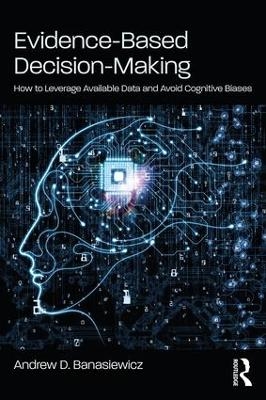
Evidence-Based Decision-Making
Routledge (Verlag)
978-1-138-48529-7 (ISBN)
Evidence-Based Decision-Making: How to Leverage Available Data and Avoid Cognitive Biases examines how a wide range of factual evidence, primarily derived from a variety of data available to organizations, can be used to improve the quality of business decision-making, by helping decision makers circumvent the various cognitive biases that adversely impact how we all think.
The book is built on the following premise: During the past decade, the new ‘data world’ emerged, in which the rush to develop competencies around business analytics and data science can be characterized as nothing less than the new commercial arms race. The ever-expanding volume and variety of data are well known, as are the great advances in data processing/analytics, data visualization, and related information production-focused capabilities. Yet, comparatively little effort has been devoted to how the informational products of business analytics and data science are ‘consumed’ or used in the organizational decision-making processes, as the available evidence shows that only some of that information is used to drive some business decisions some of the time.
Evidence-Based Decision-Making details an explicit process describing how the universe of available and applicable evidence, which includes organizational and other data, industry benchmarks, scientific studies, and professional experience, can be assessed, amalgamated, and funneled into an objective driver of key business decisions.
Introducing key concepts in relation to data and evidence, and the history of evidence-based management, this new and extremely topical book will be essential reading for researchers and students of data analytics as well as those working in the private and public sectors, and in the voluntary sector.
Dr. Andrew D. Banasiewicz is the director of data science and analytics programs at Merrimack College, a professor of business analytics at Cambridge College, and the founder of Erudite Analytics, a data analytical consultancy focused on risk assessment.
Part I: Decision-Making Challenges
Chapter 1: Subjective Evaluations
Thinking and Games
Mind vs. Machine
Learning and Remembering
The Decision-Making Brain
Chapter 2: Non-Generalizable Objectivity
Familiar Clues
Anecdotal Evidence
Best Practices & Benchmarks
Non-Representative Samples
Chapter 3: Mass Analytics
Digitization of Life
Data as the New Normal
Data in Organizations
The Analytics Industry
Part II: Evidence-Based Practice
Chapter 4: Evidence-Based Movement
The Practice and Science of Management
Evidence-Based Practice
The Road Ahead
Chapter 5: The Essence of Evidence
What is Evidence?
Empirical Evidence
Research Evidence
Experiential Evidence
Internalizing Evidence
Part III: The Empirical & Experiential Evidence Framework
Chapter 6: Probabilistic Thinking
Decision Uncertainty
Evidence Pooling
Cross-Type Amalgamation
Chapter 7: The 3E Framework
Organizational Decision-Making
The Empirical & Experiential Evidence Framework
Insight Extraction
Believability of Evidence
Chapter 8: Sourcing & Assessing: Operational Data
Data, Research, and Decision-Making
Probabilistic Analyses of Organizational Data
Operational Data and Databases
Getting Started with Operational Data
Exploring Operational Data
Exploratory Data Analysis
Confirmatory Data Analysis
Chapter 9: Sourcing & Assessing: Research, Norms, and Judgment
Thematic Analyses of Empirical Research
Summarizing Norms & Standards
Pooling Expert Judgment
Part IV: Evidence-Based Decision-Making in Organizations
Chapter 10: Internal Design & Dynamics
Organizations as Human Collectives
Business Organizations
Organizations and Decision-Making
The 3E Framework & Organizational Dynamics
Chapter 11: External Forces & Influences
External Forces
Non-Systematic Influences
| Erscheinungsdatum | 21.03.2019 |
|---|---|
| Verlagsort | London |
| Sprache | englisch |
| Maße | 152 x 229 mm |
| Gewicht | 410 g |
| Themenwelt | Wirtschaft ► Betriebswirtschaft / Management ► Unternehmensführung / Management |
| ISBN-10 | 1-138-48529-2 / 1138485292 |
| ISBN-13 | 978-1-138-48529-7 / 9781138485297 |
| Zustand | Neuware |
| Haben Sie eine Frage zum Produkt? |
aus dem Bereich


